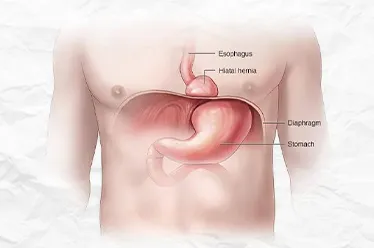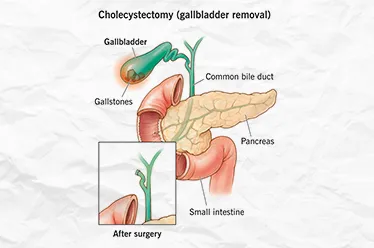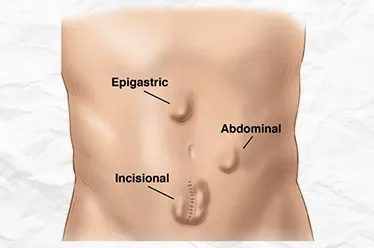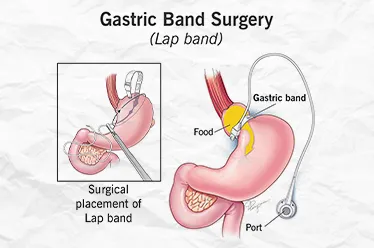
Weight Loss Surgery
as Low as
$4,500
FOR QUALIFYING PATIENTS

Weight Loss Surgery
as low as
$4,500
FOR QUALIFYING PATIENTS
At the Nicholson Clinic,
We also offer the option to perform two surgeries simultaneously if medically necessary. This approach helps patients reduce costs, save time, and recover more easily from a single surgery session instead of undergoing two separate procedures.
If you don’t have bariatric benefits but struggle with one of the below conditions that requires surgery, this could be an opportunity to use insurance to cover these procedures and allow you to pay significantly less to add on a weight loss procedure.
We may be able to perform gastric sleeve surgery alongside
one of the following surgeries:
If you have any of the above conditions, please:
So our doctors can order any necessary tests to confirm and discuss your options.
FAQs
Frequently Asked Questions
What is Paraesophageal/Hiatal Hernia Repair?
Paraesophageal/Hiatal Hernia Repair
+ Weight Loss Surgery

If you are overweight and suffer from acid reflux, you may have a paraesophageal hernia or hiatal hernia.
Research suggests that over 50% of obese patients have a hiatal hernia, with the risk increasing as BMI rises. Excess weight creates higher intra-abdominal pressure, which contributes to reflux and gastroesophageal reflux disease (GERD).
What is a Paraesophageal Hernia or Hiatal Hernia and
How Does It Cause Reflux?
A paraesophageal hernia is a type of hiatal hernia where the upper part of the stomach pushes through the diaphragm, allowing acid to reflux into the esophagus. Obesity increases pressure on the abdominal wall, worsening acid
reflux symptoms.
You may qualify if you have any of the following
• Severe reflux, GERD, or regurgitation that requires daily medication
• Difficulty swallowing or epigastric pain
• Been previously diagnosed with a paraesophageal or hiatal hernia
What is Gallbladder Removal?
Gallbladder Removal
+ Weight Loss Surgery

Gallbladder surgery is one of the most common surgical procedures in the U.S. Many of our patients suffer from gallbladder disease, as individuals who are overweight or obese have a higher risk of developing gallstones.
What are Gallstones?
Gallstones are hardened deposits that form in the gallbladder - a small organ beneath the liver that stores and releases bile for digestion. These stones can vary in size, from tiny grains to large golf ball-sized formations.
They typically form when bile contains too much cholesterol and/or bilirubin or when the gallbladder fails to empty properly. If you experience symptoms from gallstones - such as pain, nausea, or digestive issues - you may need gallbladder removal surgery.
You may qualify if you have any of the following
• Abdominal pain (right upper quadrant) or nausea usually after meals
• Had elevated liver enzymes on previous lab results
• Been previously diagnosed with gallstones
What is Abdominal Wall Hernia?
Abdominal Wall Hernia
+ Weight Loss Surgery

Abdominal wall hernias may result from prior surgeries. An estimated 15-20 percent of incisions may not heal properly at the muscular level and hernias may form as a result. They can also be caused by heavy lifting, injury or a penetrating wound. Hernias can worsen or grow due to anything that increases intra-abdominal pressure, such as heavy lifting, coughing, obesity, chronic constipation, or straining with bowel movements.
The most obvious symptom of an abdominal wall hernia is an abdominal bulge.
Why have an Abdominal Wall Hernia repaired?
Having an abdominal wall hernia repaired will not only relieve bothersome or painful symptoms, but it can also prevent future complications from occurring. If left untreated, hernias can lead to an obstruction of the intestines that can become life-threatening and cause a need for emergent surgery. Abdominal wall hernia repair can often lead to an improved quality of life and appearance.
You may qualify if you have any of the following
• A bulge at a previous surgical incision site
• A bulge around naval or upper abdominal area
What is LapBand Removal?
LapBand Removal
+ Weight Loss Surgery

LapBand removal is becoming increasingly more common with over 50% of gastric bands being removed after 7-10 years due to inadequate weight loss or complications.
LapBand Complications?
LapBands require maintenance and over time some patients may experience complications such as band erosion, band migration/slippage, band infection, gastric prolapse, esophageal and/or pouch dilation. Symptoms of a complication could be nausea, vomiting, reflux, abdominal pain or difficulty swallowing or tolerating solid foods.
You may qualify if you have any of the following
• Pain at lap band port site
• Difficulty keeping food down
• Band Slip or Erosion
Combining A General Surgery or LapBand Removal
with Weight Loss Surgery
The Good News?
If you suffer from any of these conditions AND obesity, we may able to perform reflux surgery,
gallbladder removal, hernia repair, or LapBand removal while also helping you achieve long-term weight loss - all in one surgery session.
This means:
One operation instead of two
Faster recovery
Lower overall costs
By combining general surgery or band removal with weight loss surgery, you can resolve painful symptoms and improve your overall health in a more affordable and efficient way.
© Nicholson Clinic. All Rights Reserved.
The testimonials, statements, and opinions presented on our website and social media are applicable to the individuals depicted. Results will vary and may not be representative of the experience of others. For more information, please read our Testimonial Disclaimer.
